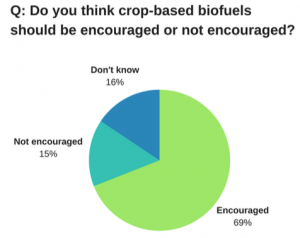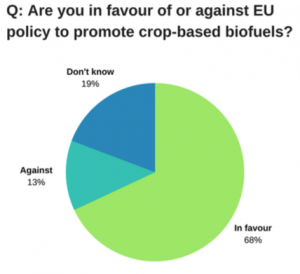Europeans overwhelmingly support the use of conventional biofuels made from crops and believe EU policy should encourage it, according to an EU-wide opinion survey released today.
 More than 69 percent of Europeans surveyed say conventional biofuels should be encouraged, while just 15 percent think they should not, according to the EuroPulse poll of
More than 69 percent of Europeans surveyed say conventional biofuels should be encouraged, while just 15 percent think they should not, according to the EuroPulse poll of
11,283 respondents in 28 EU countries. The survey also found that 68 percent of Europeans favour EU policies to support crop-based conventional biofuels, while just 12 percent are against such policies.
The results are significant in light of the European Commission’s proposal to phase out the use of conventional biofuels such as European ethanol – for which its main justification is a claim that the European public opposes what Commission officials have misleadingly termed “food-based fuel.”
The new poll clearly disproves that notion, showing that only a small fraction of Europeans oppose the use of biofuels made from crops such as sugar beet, corn and wheat grown in Europe.
The findings also re-confirm the Commission’s own research in the last major EU-wide survey of public opinion on this issue: the EU’s 2010 Eurobarometer Biotechnology poll. That survey also found “broad support for biofuels” and that “a large majority of Europeans (72%) feel that biofuels should be encouraged and only 20% hold the opposite view.”
 Opposition to biofuels decreased further in the new survey compared to the Eurobarometer poll – dropping from 20 percent to 15 percent.
Opposition to biofuels decreased further in the new survey compared to the Eurobarometer poll – dropping from 20 percent to 15 percent.
“The Commission’s phase-out proposal threatens to remove one of the EU’s best options for reducing greenhouse gases and decarbonising transport – biofuels produced sustainably in Europe,” said Emmanuel Desplechin, Secretary General of ePURE, the European renewable ethanol association.
“Commission policy should be based on science and evidence rather than on a misreading of public opinion,” Desplechin said. “While it is clear that Europeans support our technology, we also have the facts on our side: European ethanol has 64% GHG savings compared to petrol and is an essential tool for decarbonising EU transport – one that is produced sustainably by European farmers, is available at scale and works in existing infrastructure and cars.”
The Commission proposal would reduce the maximum contribution of conventional biofuels from a maximum of 7% of road transport energy in 2021 to 3.8% in 2030.
Road transport is currently 95% reliant on oil and accounts for 20% of EU emissions. But rather than ensuring the growth of realistic renewable and low-carbon energy sources in transport by 2030, the Commission’s proposal is counterproductive to the EU’s climate and energy goals, discourages investment in new technology and ignores the Commission’s own science.
Methodology: The new poll was conducted in December 2016 by German research firm Dalia, and commissioned by ePURE, the European renewable ethanol association. The sample of n=11.283 respondents was drawn across all 28 EU Member States, taking into account current population distributions with regard to age (14-65 years), gender and region/country.
For more details on the findings and on the methodology, please click here.
Source
ePure, press release, 2017-01-23.
Supplier
European Commission
European Renewable Ethanol Association (ePURE)
Share
Renewable Carbon News – Daily Newsletter
Subscribe to our daily email newsletter – the world's leading newsletter on renewable materials and chemicals










